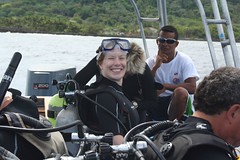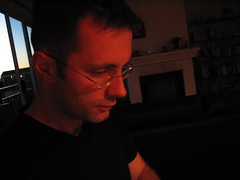When guide books describe the Sinai Peninsula, they abound in superlative adjectives. Lonely Planet calls it “a place of surreal beauty” if I remember correctly - why does it have to be "surreal"?. From the coastal highway it looks like a string of ragged brown peaks, lacking the slightest trace of vegetation, following without end under the metallic blue sky. I don’t have any pictures from the rest of our stay in Egypt. Deserts have their fascination, but make really lousy picture subjects, unless you’re a pro… or you wake up really early, neither of which applies to me.
The real beauty of Sinai lies under water, and our goal – like the goal of most tourists who visit this place – was to spend as much time as possible in the depths. The Red Sea coral reefs near Dahab are a true delight, a must-see for any diver – the coral is abundant and varied, plenty of colorful fish live and hunt on it, and the visibility is ideal. If you go to places like the resort towns of Dahab and Sharm el-Sheikh there’s nothing else to do besides diving – unless you plan to spend all your day and your money at one of the many restaurants and cafés.
Outside of the tourist areas of those towns, the garbage is scattered everywhere – on the side of the roads, in ditches and back alleys, wherever the wind can drop it. There you can find everything from plastic bottles to animal carcasses. Sure, tourism contributes to the waste problem, but visitors are hardly responsible for littering, if you don’t count cigarette butts. The blame lies with the locals, the restaurants’ management and the government’s garbage collection authority, all of whom seem to apply the “not my problem” rule quite efficiently. The garbage collection truck picks up the trash, but not as often as it should, and it doesn’t go off the main road. The locals leave the trash bags in front of their houses for pick up, but they don’t bother to take it up to the main road. Before the truck passes, the wild cats, dogs, and goats tear the bags open and rummage for food. The wind takes care of the rest. So I guess it’s the cats’ fault after all... Paul, our dive master, a retired project manager from England who has been making a living in Dahab for a while, tells us as we return from the Blue Hole dive site, huddled in the back of the dive shop’s pickup truck: “I swear, sometimes I think… it’s a beautiful country, but these people don’t deserve it!”
As for me, after the weeks spent in Egypt, I was left with one question to answer: would I ever come back to visit this country? It has been, no doubt, one of the most interesting, diverse and safe places we have seen on our trip, but the most exhausting and irritating as well. Maybe I will take a charter flight to Sharm el-Sheikh, arrange for private transfer to a hotel in Dahab, dive day-in day-out, twice a day for a week, and go back the same way I came, avoiding the hassle of Cairo and steering clear of the souqs. If I’m in a good mood I may be inclined to fend off the assault of the camel-ride touts at the pyramids of Giza. And with enough peace of mind left, I may even go down south again, but I’m afraid – and secretly hoping – that I’ll meet Ismael again and I’ll spend all my time playing backgammon and drinking tea rather than visiting Abu Simbel.
A tough decision… but one thing I know: the falafel here is awesome!
Posted from Delphi, Greece.







